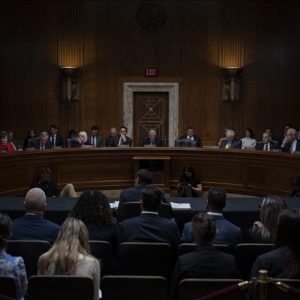National Nurses United Urges Biden Admin to Crack Down on Hospital Monopolies
National Nurses United, the largest union of registered nurses in the U.S., is calling on the White House to bolster federal antitrust probes and rules to reduce the detrimental impacts of healthcare industry mergers and acquisitions on patients, workers, and communities.
President Joe Biden recently ordered the Federal Trade Commission (FTC) and the Department of Justice (DOJ) to update their horizontal and vertical merger guidelines. The guidelines are said to influence how regulators analyze potentially anti-competitive deals. As part of the revision process, the agencies have been listening to and accepting public testimony and comments through Thursday.
In comments submitted earlier this week, NNU’s lead regulatory policy specialist, Carmen Comsti, wrote that “anti-competitive behavior in the healthcare sector through market consolidation is a threat to the health and safety of nurses and other healthcare workers and is making our patients sicker.”
The “monopoly power of employers,” said Comsti, “exacerbates problems with healthcare access and affordability” for the public. For nurses and other healthcare workers, she added, it “depresses wages and dilutes the power of workers to advocate for better working conditions and patient safety.”
In her hearing testimony, Kelley Tyler, an NNU member and RN at Mission Healthcare in Asheville, North Carolina, described how conditions at her community hospital deteriorated after corporate giant HCA Healthcare acquired it.
“Services like rural cancer care and wheelchair and seating clinics have been cut completely,” said Tyler. “HCA has shuttered primary care clinics and driven out hundreds of doctors and nurses. Our more vulnerable populations have suffered, especially seniors, who are often forced to drive over an hour for needed care.”
According to the NNU: “Traditional distinctions between vertical and horizontal mergers have largely evaporated due to the abuse of market power by large healthcare systems. Corporate financial interests’ integration into and control of different types of healthcare facilities can incentivize interference with the professional judgment of practitioners and reduce practitioner autonomy.”
NNU urged the FTC and DOJ to pay particularly close attention to “the deleterious effects of private equity ownership in healthcare,” which Comsti wrote “is particularly damaging and even deadly.” She pointed out that healthcare facilities owned or operated by private equity firms tend to have “lower staffing levels, higher prices for care, and higher medical debt for patients.”
“Healthcare market concentration is strongly associated with huge increases in predatory pricing practices by insurance companies and other payers and hospital charges,” NNU noted. This has contributed to “a national scandal over medical debt and… forcing up to 40% of Americans skip needed care due to escalating costs.”
According to NNU, two-thirds of hospitals now belong to multi-facility systems, up from 37% in 1994. An NNU report published in 2020 found that U.S. hospitals charge patients more than four times the cost of care, on average. The highest charge-to-cost ratios were found at hospitals owned by multi-facility systems, the vast majority of which are run by for-profit corporations.
To limit the damages associated with healthcare industry mergers and acquisitions, NNU is urging the FTC and DOJ “to expand antitrust scrutiny and other guidelines in reviewing past practices of the buyers, such as higher charges to payers and patients, hospital closures and patient service cuts, adverse impacts on independent safety-net hospitals and public healthcare facilities, past anti-union behavior, and degradation of patient privacy and information sharing with technology firms.”
“These measures and additional remedies in merger and acquisition guidelines,” the union said, “can protect patients, workers, and communities.”
Originally published at Commondreams.org, written by Kenny Stancil.










